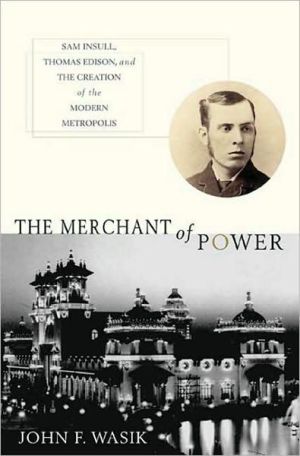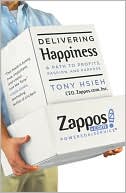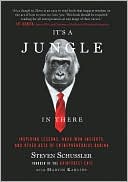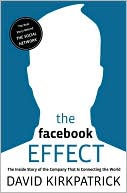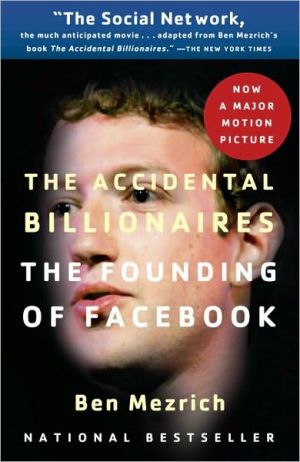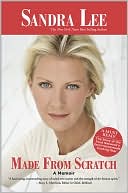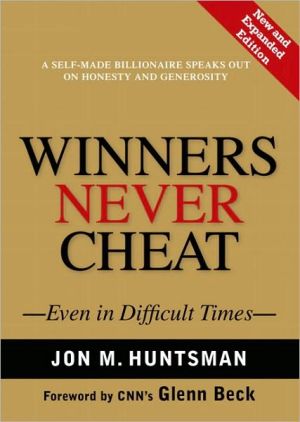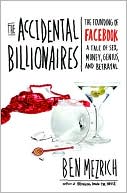Merchant of Power: Sam Insull, Thomas Edison, and the Creation of the Modern Metropolis
"At the height of his career Samuel Insull was one of the richest men in the world, a celebrity businessman who commanded a commercial empire and wielded enormous influence in political and financial circles. Yet he died deeply in debt and almost universally despised by the American public, and today his name has nearly been forgotten. The Merchant of Power recounts the life of this extraordinary man, following him from his impoverished childhood to a job as Thomas Edison's secretary, and on...
Search in google:
The dramatic tale of the man who created the modern city—and ended up at the center of America's first corporate scandal Publishers Weekly Sam Insull is the forgotten energy tycoon of the early 20th century. As Wasik, a columnist for Bloomberg News, relates, Insull came to America from England in 1881 with $200 in his pocket to be Thomas Edison's private secretary and died in a Paris metro station in 1938 with 84 cents in his pocket. In between, he helped Edison light up New York and moved to Chicago, where he built a corporate empire that raised his personal worth to over $150 million ($1.7 billion in today's dollars); then he lost everything in the Great Depression. The collapse of his companies made him the b te noire of thousands of his now destitute Chicago shareholders and, according to the author, a model for Orson Welles's Citizen Kane. Wasik notes that Insull was instrumental in two fundamental shifts in American history: first, his innovations in the delivery of electric power made possible the consumer age; second, the failure of his financial empire became a basis for the New Deal laws that now govern much of corporate America. Wasik writes well, and Insull is a complex man whose life and times make worthwhile reading. B&w photos. (Mar. 16) Copyright 2006 Reed Business Information.
Preface • Introduction • Tireless as the Tides • The Pearl in the Oyster • Crisis & Consolidation • The Wide-Open City • Love & War • A New Kind of Power* All that Jazz • Managing the Spectacle • Attack from All Sides • Abdication & Exile • Facing the Music • In the Fullness of Time
\ Publishers WeeklySam Insull is the forgotten energy tycoon of the early 20th century. As Wasik, a columnist for Bloomberg News, relates, Insull came to America from England in 1881 with $200 in his pocket to be Thomas Edison's private secretary and died in a Paris metro station in 1938 with 84 cents in his pocket. In between, he helped Edison light up New York and moved to Chicago, where he built a corporate empire that raised his personal worth to over $150 million ($1.7 billion in today's dollars); then he lost everything in the Great Depression. The collapse of his companies made him the b te noire of thousands of his now destitute Chicago shareholders and, according to the author, a model for Orson Welles's Citizen Kane. Wasik notes that Insull was instrumental in two fundamental shifts in American history: first, his innovations in the delivery of electric power made possible the consumer age; second, the failure of his financial empire became a basis for the New Deal laws that now govern much of corporate America. Wasik writes well, and Insull is a complex man whose life and times make worthwhile reading. B&w photos. (Mar. 16) Copyright 2006 Reed Business Information.\ \ \ \ \ Library JournalSamuel Insull (1859-1938) is hardly a household name, but at the height of his popularity he appeared on the cover of Time magazine as the rags-to-riches British-born secretary to Thomas Edison who amassed enormous wealth and power by supplying 32 states with cheap electricity. Veteran consumer journalist Wasik, who has written numerous books on retirement and investment tips, takes a turn at biography by attempting to update distinguished historian Forrest McDonald's definitive Insull. Wasik's sturdy endeavor does not match McDonald's deft telling of how Insull transformed Edison's invention into the illumination of millions of homes through a network of electrical power grids and how the ultimate collapse of Insull's overleveraged position left him broken and bankrupt while ruining the finances of his supporters. Wasik may have taken his cue from current corporate scandals such as Enron and WorldCom in deciding to pluck Insull from semiobscurity, as many of Insull's contemporaries (including FDR) believed him to be guilty (he was acquitted) of orchestrating the first large-scale corporate deception. An optional purchase for large public and academic libraries.-Peter R. Latusek, Stanford Graduate Sch. of Business Lib., CA Copyright 2006 Reed Business Information.\ \ \ From the Publisher"Brilliant . . . brings Insull back to complicated life, and should revive interest in a forgotten giant."—Chicago Sun-Times "[A] focused look at one of the most interesting historical figures you've never heard of . . . a fascinating cautionary tale."—Fortune "Does a fine job of telling the early story of utilities, moguls and scandal."—Chicago Tribune "One of the most magnetic and powerful con artists of the Great Depression was Sam Insull. Patron of the arts, philanthropist and Thomas Edison's right hand, he shafted thousands of investors large and small. . . . I found the work of John Wasik not only personally enthralling but an informal history of that traumatic time."—Studs Terkel "[A] bittersweet biography of one of the titans of American industry, business and finance . . . Highly readable. . . ."—Fort Worth Star-Telegram "Wasik writes well, and Insull is a complex man whose life and times makes worthwhile reading."—Publishers Weekly"Bloomberg News columnist John Wasik points out in a new biography, Merchant of Power, Insull started as the financial manager for a big man—not Ken Lay, but Thomas Edison. . . ."—The New York Sun"Wasik [has] taken his cue from current corporate scandals such as Enron and WorldCom in deciding to pluck Insull from semiobscurity, as many of Insull's contemporaries (including FDR) believed him to be guilty (he was acquitted) of orchestrating the first large-scale corporate deception."—Library Journal\ \
